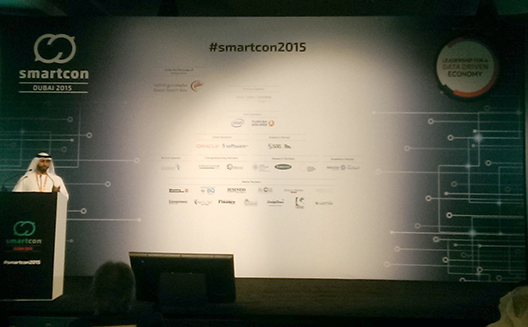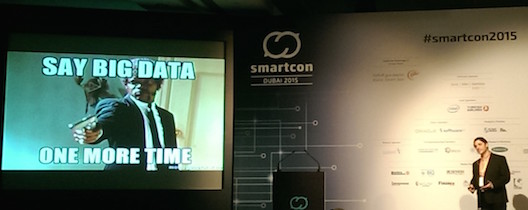Big Data leading innovation, SmartCon 2015


Bora
Arslan believes that big data is overused and exaggerated, creating
mistrust in people. (Images via Pamela Kesrouani)
Big data “will turn into the biggest catalyst for change in the next 10 years,” said Analytics Center founder Hamit Hamutcu.
Speaking at SmartCon 2015, held November 23 to 24 in Dubai, the co-organizer of the conference was addressing the main talking point of the two day event.
“Some polls even revealed that this [technology] will have an influence almost as huge as the invention of the internet.” Indeed, he revealed that big data had contributed, in recent years, in changing three levels in our lives: workplace, personal life and the country we live in.
Ramez Shehadi, of Booz Allen Hamilton, agreed with Hamutcu saying that big data “is everything, it’s like the blood in the veins, where there’s no life without it.”
“In the past,” Shehadi said, “data was in isolated channels and departments, and we weren’t able to recognize the patterns and information and turn it into knowledge, but technology has changed the situation.”
Hamutcu also explained that the challenges of big data cannot be treated as singular entities, but rather as an ecosystem that collaborates with a structure of support.
For some the term is overused though. So much so that it creates fear in people, according to Bora Arslan, analytics and innovation executive at financial comparison site Comparethemarket.com.
For Arslan it is really a simple concept that relies on the “three V’s” - volume, which increases drastically; variety, because we’re all “online at the same time”; and the “velocity” in which the data is transmitted.
So, big data changes everything, and in the course of the events, speakers dealt with the sectors changed by this filed, and they can be summarized in the following three points:
Disruptive tech
Is big data the result of tech or vice versa? This was a question posed during the conference. “It’s a cycle where big data drives innovative technology, and the latter drives more data,” said Hamutcu.
Shehadi added that technology has allowed us to analyze huge amounts of data and derive value from it. In short, both sides are equally important.
Tareq Abudawood, director of the National Centre for Computation Technologies and Applied Mathematics (CTAM) at King AbdulAziz city, spoke about how artificial intelligence can be a catalyst for big data. In this way it is helping in the scanning of breast cancer. “Thanks to extremely intelligent machines and algorithms, we can detect, through X-rays, the kind of cancer and how to treat it,” he said.
CEO and cofounder of The Keys Academy, Ayesha Khanna noted how big data had become a cornerstone in all new industries, allowing for the creation of modern self-cleaning tools, regenerative material, or even truck sensors that signal to drivers when their tires need changing.

“Tech has
changed Big Data” said Ramez Shehadi.
Digital marketing and advertising
Akanksha Goel, director at Socialize advertising agency said that big data was something that advertising agencies had not previously thought of.
According to Goel there are two kinds of relevant data that can be gleaned for her sector. For example, the data Mercedes Benz has about its clients, and then “earned data”, that which is generated when users tweet about or share images of their cars on social media.
In addition to that, she said that the challenge for advertising agencies lies in collecting this data to utilize their benefits to the max. As an example Goel also spoke of the LeadIT program launched by Facebook in an aim to fill the gap between marketing and CRM.

Ahmad Bin
Humaidan talking about smart governance.
Smart cities and government
Big data also plays an important role in building a smart cities, as discussed before on Wamda. It allows for the creation of better services to citizens to facilitate their jobs.
Dubai Smart Government is an example of a player in the region offering specialized services to its citizens. Their DubaiNow app links users to any public services, like paying their phone or electricity bill. They also have the SmartEmployee app targeting employees of the public sector to create a customized employee self-service menu with services such as leave approval and payroll issues.
Ahmad bin Humaidan, director general Dubai Smart
Government, said that creating smart laws that
facilitate the using of big data to offer valuable services to
citizens is crucial. No doubt this technology has helped solve
various problems in many countries, like road traffic in
Singapore.
Big data is not just a temporary
trend, it’s the essence of the future, something that all Smartcon
participants agreed upon. Despite this, there are concerns about
the privacy and security of data, and this can be an obstacle. Many
are optimistic that the collective experiences, technology and
acquired skills are all factors that help us manage all
possibilities.
Starting in Istanbul and then moving onto Johannesburg after Dubai Smartcon aims to become a platform to different players, from individuals to companies and governments, where tech and entrepreneurship can meet to allow the exchange of ideas, and planning for future steps.


